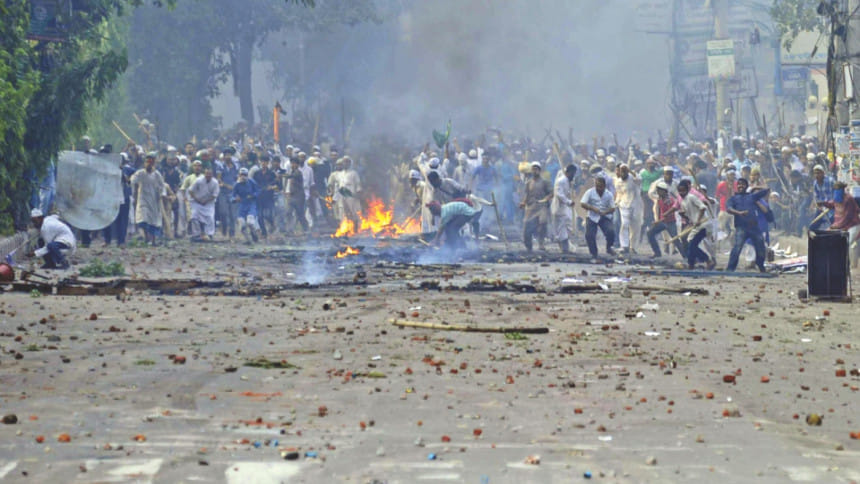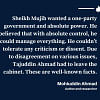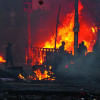Only 3 of 53 cases see progress in probe

Fifty-three cases were filed over the May 5 mayhem by thousands of Hefajat-e Islam men in the capital three years ago, but investigators have made headway in only “three cases”.
On this day in 2013, the Hefajat men got locked in deadly clashes with law enforcers and the ruling Awami League men and turned the capital city into a battlefield.
They set fire to hundreds of shops, vehicles and police outposts and looted shops, including those having Islamic books.
Although Hefajat claimed that 2,000 of its leaders and activists were killed in the incident, the government's death figure stood at only 13, including three policemen. Hefajat could not provide names and addresses in support of its claim.
Of the 53 cases, 33 were filed with Paltan Police Station, six with Motijheel Police Station, three with Shahbagh Police Station, two with Ramna Police Station and the rest with other police stations in the city. At least seven of them were lodged as murder cases.
Police, government officials, relatives of the victims, Islamist leaders, businessmen, shop owners, employees of different offices and political parties filed the cases. More than 50,000 leaders and activists of Hefajat-e Islam and Jamaat-e-Islami were made accused in the cases for carrying out the violence.
The charges being brought in the cases include illegal assembling and attacking police and people with firearms and explosives to kill them, attacking police stations with arms and bombs to loot firearms, attacking government offices, banks and setting those on fire, setting fire to holy Quran and Hadith and other Islamic books, looting such books and hurting the Muslim sentiments.
Police arrested at least 376 accused, including some Hefajat leaders, but all of them were later released on bail.
Hefajat's General Secretary Junaid Babunagari, the main accused in sub-inspector Shahjahan murder case, was arrested on May 6 in 2013, but was released on bail on May 29 that year on health ground.
Shahjahan was killed during a clash between Hefajat men and law enforcers at Motijheel.
During interrogation in police remand, Babunagari confessed to the involvement of the activists of Hefajat, Jamaat, BNP and its front organisations in the anarchy, court sources said.
Harun bin Izhar Chowdhury, son of Hefajat's Nayeb-e-Ameer Mufti Izharul Islam, was also arrested. But he too was released on bail.
Some BNP leaders, including Moudud Ahmed and Sadeque Hossain Khoka, were also shown arrested in the cases. But most of them got bail.
Monirul Islam, additional commissioner of Dhaka Metropolitan Police, yesterday said that out of 53 cases, charge sheets were submitted in three cases, 15 cases were being investigated by the Detective Branch of police while 35 cases are being probed by different police stations.
DMP Deputy Commissioner (media) Maruf Hossain Sorder said that of the three cases, one was filed with Ramna Police Station and the two others with Kalabagan Police Station.
Maruf, however, could not say when the charge sheets of these cases were submitted.
However, a staff at the office of General Recording Officer at the Chief Metropolitan Magistrate's Court in Dhaka said no charge sheet was submitted in any case filed with Ramna and Kalabagan police stations.
Asked about the reason behind the poor progress in investigation, Monirul said, “A large number of people were present during the incident. It takes time to scrutinise the names and details of those who were involved.”
Veteran journalist and writer Shahriar Kabir attributed the slow progress in investigation and the release of the accused to the government's double standard policy.
“On one hand, the government is saying that it has taken zero tolerance approach towards terrorism. On the other hand, it is compromising with the godfather of terrorism,” he said.
This double standard would be suicidal not only for the Awami League, but also for the whole nation, he added.
Shahriar Kabir, who was also a victim of the Hefajet mayhem, said that although the Hefejat leaders admitted their role in the atrocities, some ruling party leaders visited Hefajat leaders to compromise with them.
Shahriar, also the acting president of Ekaturrer Ghatak Dalal Nirmul Committee, claimed that he along with 26 other Nirmul committee members and four policemen were wounded in the Hefajat attack.
Contacted, Hefajat-e- Islam Organising Secretary Azizul Haque Islamabadi told The Daily Star that around 50 cases were lodged following the “Shapla Chattar incident” to harass the leaders and activists of the organisation.
The Hefajat leader claimed that the “Shapla Chattar movement” was not a movement to overthrow the government; rather it was a movement against the persons or atheist bloggers who insult Islam.
“From our side, there is no scope of maintaining communication with the government,” said Azizul Haque. The government communicates with them because it wants to create a good relation with Hefajat, he added.
“The government or the opposition wants to keep a relation with Hefajat, as the organisation has the capacity to exert an influence in the society.”
He also claimed that Hefajat-e Islam was not a political organisation.

 For all latest news, follow The Daily Star's Google News channel.
For all latest news, follow The Daily Star's Google News channel. 








Comments